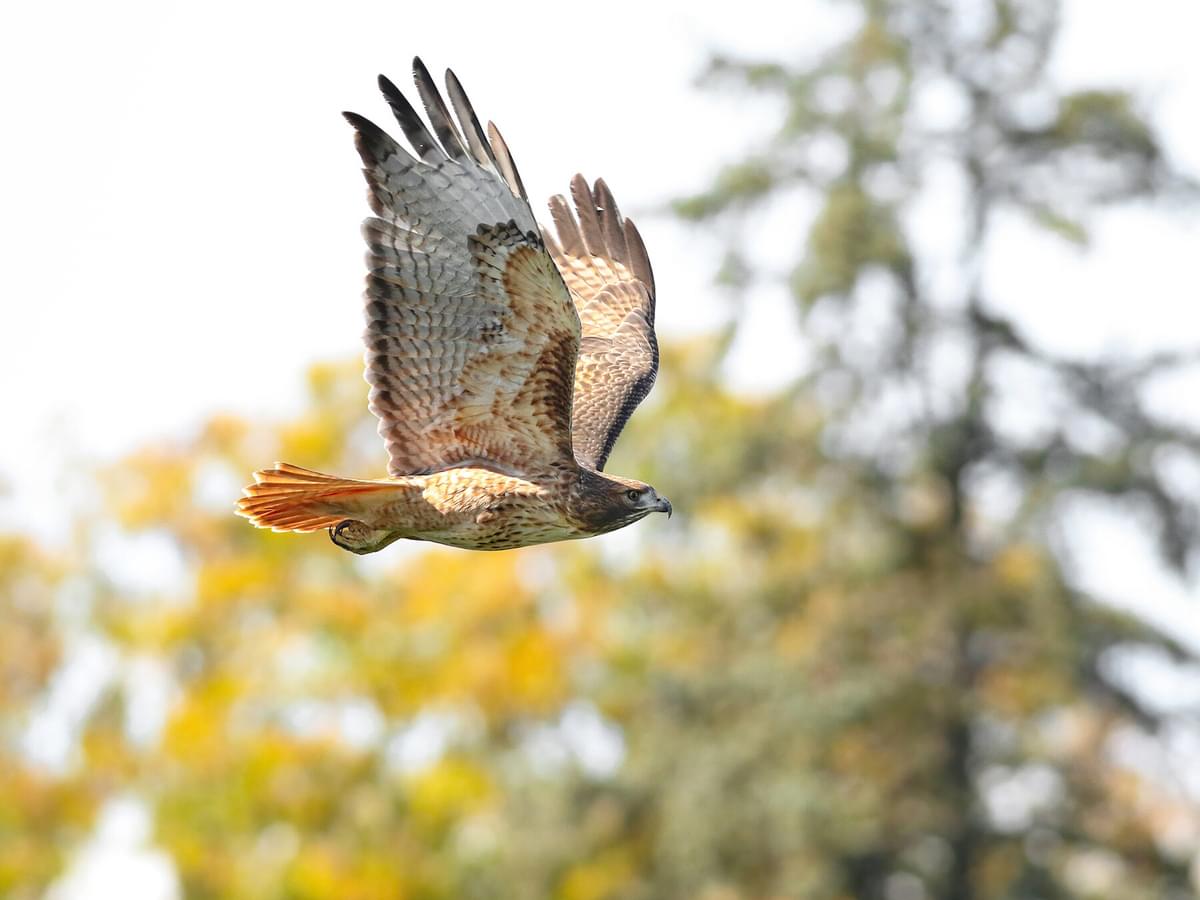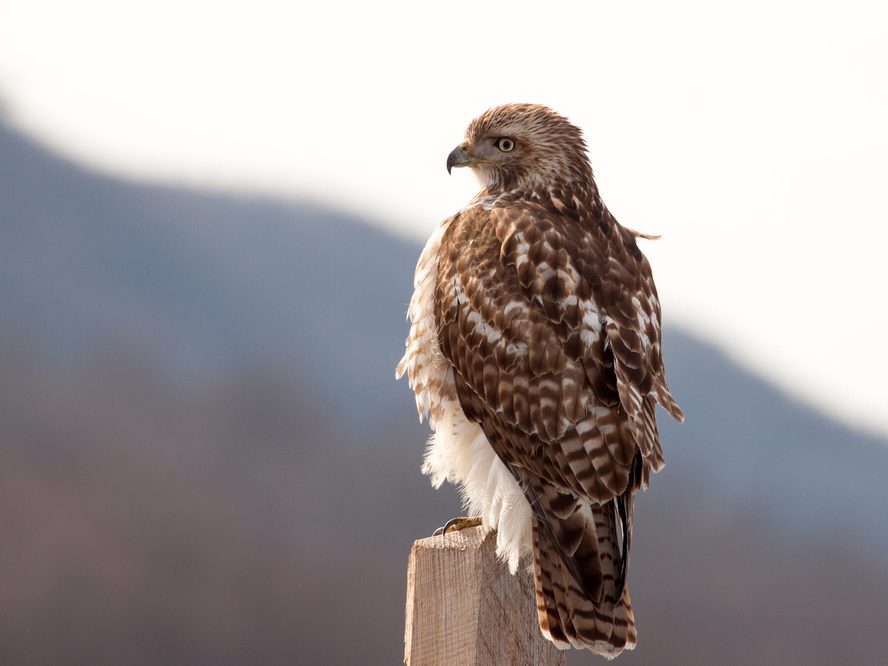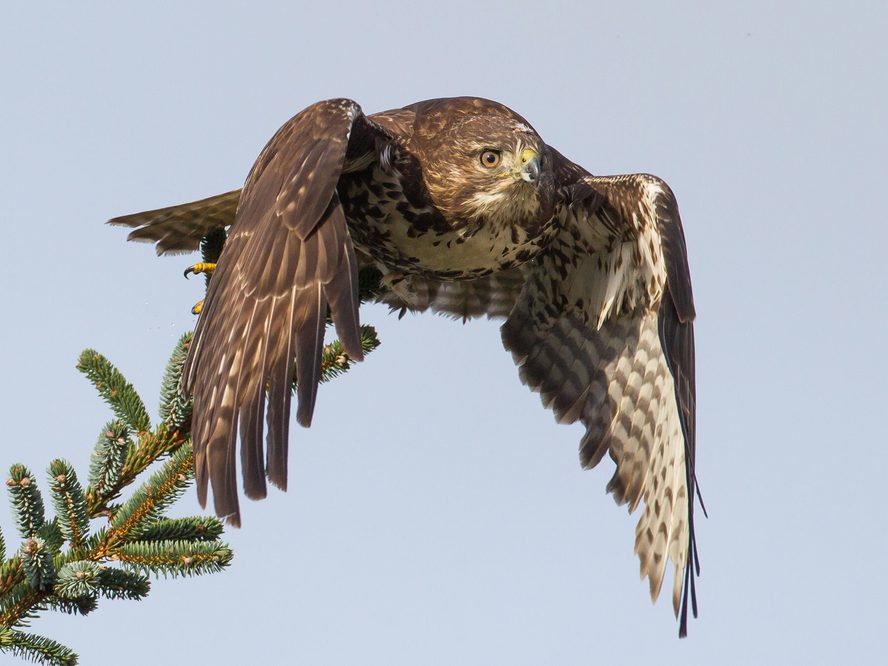Jump to Section
How Long Do Red-Tailed Hawks Live? (Red-tailed Hawk Lifespan)
Last updated: 5 September 2022

One of the most widespread birds of prey in North America, Red-tailed hawks can be found from Alaska and northern Canada, throughout the United States into Mexico, and further south into Central America.
Their diverse range of habitats includes both extremely harsh conditions with sparse landscapes and milder climates with more plentiful shelter and readily available sources of food. Below, we’ll be looking at how long Red-tailed hawks live for and how these environmental factors may affect their lifespan.
In the wild, free-ranging Red-tailed hawks can be expected to live for some 10-15 years or even longer. However, in captivity, the life expectancy of these opportunistic birds of prey commonly known as “chickenhawks” may be considerably higher.
Whilst under some circumstances, Red-tailed hawks can live for two decades or more, many do not even make it as far as maturity. Research shows that up to 36% of Red-tails do not survive past the end of their first year.
Read on to learn more about the typical lifespan of a Red-tailed hawk and discover why some die young, and others go on to live a significantly longer life.

On average, Red-tailed hawks live for between 10 and 15 years in the wild
What is the typical lifespan of a Red-tailed hawk?
Whether a Red-tailed hawk is living in captivity or in its natural habitat bears a significant influence on how long it can be expected to live for. Factors such as protection from predators, a managed diet, and lack of exposure to some of the more common hazards that can cause premature death all help to contribute to a potentially longer life for captive hawks.
How long do Red-tailed hawks live in the wild?
In the wild, free-ranging Red-tailed hawks typically live for around 10 to 15 years. However, some individuals are known to have lived for double this. A wild Red-tailed hawk, first banded in 1991, was spotted again in Michigan in 2011, making it an impressive 20 years and 8 months old. Banding programs show other aged Red-tails surviving well into their 20s.

Red-tailed hawk coming in to land in the forest
How long do Red-tailed hawks live in captivity?
In captivity, individual Red-tailed hawks have been recorded to have lived for more than 20 years on several occasions. With access to safe shelter, regular supplies of food, and the absence of many of the hazards their free-ranging counterparts encounter, the life expectancy of captive hawks is naturally extended.
How do most Red-tailed hawks die?
There are many ways that Red-tailed hawks can meet a premature death, including human intervention, accidental death, e.g. from entanglement in or electrocution by power cables or falling from nest sites, and also poisoning from eating prey such as rodents that have ingested harmful toxins via human pest control action.
Large numbers of young Red-tailed hawks fail to reach the end of their first year due to inexperience as they learn to navigate their own way in the world. In urban areas, causes of death commonly include vehicle collisions, flying into human-made structures, and being deliberately shot or caught in traps by humans, despite the species being protected in the United States, Canada, and Mexico.

A red-tailed hawk perched on a pole
What is the life cycle of a Red-tailed hawk?
- Both male and female Red-tailed hawks take turns to incubate their eggs for 28 days.
- Eyasses are born blind, and covered in white down.
- After hatching, young Red-tailed hawks are tended and fed by both parents and remain in the nest for 42-46 days after hatching.
- After leaving the nest, the fledglings remain close to their parents’ territory for around 10 weeks.
- By six months, they’ve perfected the art of soaring flight and hunting and are ready to make their own way in the world.
Typically, Red-tailed hawks reach sexual maturity from around 18 months, although they may not begin breeding until their third year. After they find a mate, they build a nest together from sticks in the highest branches of a tree or on a lofty cliff ledge.
Red-tailed hawks are monogamous birds and may bond for life, changing partners only when one bird dies. On average, their lifespan is around 10-12 years, but they can live for well over 20 years in the wild, and have been known to reach almost 30 years of age in captivity.

Immature Red-tailed Hawk perched on a snag
What are the predators of Red-tailed hawks?
One of the greatest predators of the Red-tailed hawk are great horned owls, which regularly target unattended nestlings and juvenile birds. Up to an estimated 36 percent of all Red-tailed hawk nestlings may be lost to predation in this way. Other birds of prey and wild animals such as coyotes, bobcats, red foxes, and racoons are also potential predators, particularly if they come across an injured hawk.
Humans practicing illegal hunting, either for food or to drive out hawk populations from their land, can also be counted among the biggest known threat to the survival of Red-tailed hawks.

A red-tailed hawk stood in the grass, The Portlands, Toronto, Ontario, Canada
How old is the oldest Red-tailed hawk?
Examples of individual long-lived Red-tailed hawks include a female that reached 29.5 years of age in captivity. In the case of veteran wild birds, examples have been recorded as having reached 25 years and 9 months and 23 years and 5 months.
One such example is Pale Male, something of a celebrity in the bird of prey world, a wild Red-tailed hawk that has been observed in New York City’s Central Park since 1991, when he was first spotted as a one year old.
Although the bird matching Pale Male’s distinctive, light-colored plumage continued to be observed at the same nest site in 2021, as the original bird was never ringed, it is impossible to conclusively state whether it is in fact the same hawk, which would have survived to an impressive 31 years of age.
How long can Red-tailed hawks live without food?
Red-tailed hawks generally need to feed every one to three days, depending on the size of their last meal, and whether they are feeding young nestlings.
For young nestlings and juvenile birds in particular, starvation can be a major cause of death in situations where food sources are not plentiful.
To maximize their chances of survival and increase access to food supplies, Red-tailed hawks living in the extreme north of Canada and Alaska will migrate in winter in search of a less harsh environment.

Red-tailed hawk perched on a tree stump
Do Red-tailed hawks survive winter?
Red-tailed hawks are predatory hunters and in winter, they survive on a diet of jackrabbits, ground squirrels, rats and other small rodents. They also feed on snakes, small birds and their keen eyesight enables them to spot prey even on the snowiest of landscapes. In winter they typically consume a significantly higher number of calories per day than in summer months.
In order to avoid the harshest conditions and potential food shortages, Red-tailed hawks living in far northern regions will migrate to warmer climates in winter months.
Are Red-tailed hawks protected?
When the Migratory Bird Treaty Act of 1918 was passed, it introduced vital protection for Red-tailed hawks. Until then, as the hawks were widely regarded as pests and predators, their numbers could be legally controlled by shooting. As well as protecting these birds from being hunted, the legislation banned hawks from being taken from the wild or purchased as pets.
Exceptions to this law include falconers and wildlife rehabilitation professionals and centers, who may care for Red-tailed hawks in captivity.
The Red-tailed hawk is currently not classified as endangered or threatened, the United States Fish and Wildlife Service.
On this page
- What is the typical lifespan of a Red-tailed hawk?
- How long do Red-tailed hawks live in the wild?
- How long do Red-tailed hawks live in captivity?
- How do most Red-tailed hawks die?
- What is the life cycle of a Red-tailed hawk?
- What are the predators of Red-tailed hawks?
- How old is the oldest Red-tailed hawk?
- How long can Red-tailed hawks live without food?
- Do Red-tailed hawks survive winter?
- Are Red-tailed hawks protected?






